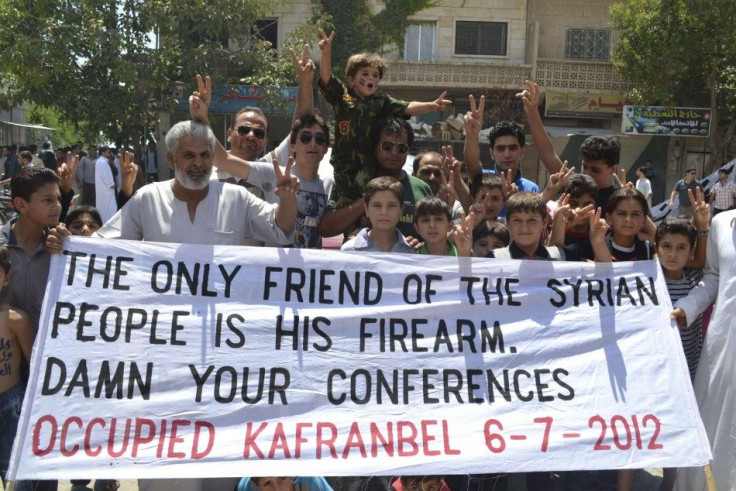Annan Claims Progress With Assad As Russia Backs Off Support For Dictator

U.N. envoy Kofi Annan said he and President Bashar al-Assad agreed on Monday on an approach to Syria's conflict that he would now take to the opposition, as Russia, Assad's main protector, distanced itself further from him.
Russia will halt arms shipments to Syria, a senior defense official in Moscow said Monday, more than a year and half into an uprising in the Middle Eastern country that has killed at least 16,000 people, mostly civilians.
Widely criticized for supporting the bloody Assad regime and thwarting all efforts by the United Nations to condemn Damascus, the Russians may finally be heeding warnings that it must stop enabling the bloodshed.
Vyacheslav Dzirkaln, deputy chief of the Russian military and technical cooperation agency, said Russia will not agree to any more arms agreements with Syria until the current crisis abates.
Russia's President Vladimir Putin also said that both sides of the Syrian conflict must enter into peace negotiations.
I am convinced that we must do everything possible to force the conflicting sides to find a peaceful political solution to all the disputed issues, Putin said Monday, following a meeting between Russian Foreign Ninister Sergei Lavrov and a senior Syrian opposition leader, Michel Kilo, in Moscow.
Annan, after meeting with Assad, flew on to Iran for talks with the main regional ally of Damascus, Reuters reported.
The former U.N. secretary general is trying to rescue his six-point peace plan, which was worked out with the Syrian government and rebels in April but faltered because the ceasefire it was supposed to begin with never took hold.
Major powers agreed at a meeting with Annan on June 30 that a transitional government should be set up in Syria, but remain at odds over what part Assad might play in the process.
I just had a positive and constructive discussion with President Assad, Annan said before leaving for Tehran.
We discussed the need to end the violence and ways and means of doing so, Annan told reporters in Damascus, according to The New York Times. We agreed on an approach which I will share with the armed opposition. I also stressed the importance of moving ahead with a political dialogue, which the president accepts.
He gave no details, but again stressed the importance of halting violence that has killed more than 15,000 people in 16 months, by an opposition count.
Syrian Foreign Ministry spokesman Jihad Makdissi said in a Twitter message: In both meetings we reassured Annan of Syria's commitment to implement the 6-point plan and hoped (the) other side is mutually committed.
In a German TV interview on Sunday, Assad said he remained committed to Annan's plan and accused the United States, Saudi Arabia, Qatar and Turkey of supplying arms and logistical support to insurgents fighting to end 42 years of Assad family domination.
We know that (Annan) is coming up against countless obstacles but his plan should not be allowed to fail, it is a very good plan, he told Germany's ARD network.
The main obstacle (is) that many countries don't want (it) to succeed. So they offer political support and they still send armaments and send money to terrorists in Syria.
A delegation of opposition figures representing the Syrian National Council, the main anti-Assad umbrella group, traveled to Moscow at the invitation of the Foreign Ministry.
The Russians should know that the regime has now become a threat not just to Syria but also a threat to the security of the region, and we have started seeing that in Lebanon and Turkey, George Sabra, a member of the delegation who represents Syria's Christian community, told the Times.
Sabra said: Of course, the main headline of this visit is to prepare for what is next. Why would the Russians want to meet with the opposition? Why would they want to build new relations? There are preparations for a new era.
Samir Nachar, another delegation member, said that we felt a shift in the Russians' position during a meeting in Paris last week of the so-called Friends of Syria group of anti-Assad Arab and Western countries. Friends told us to visit Russia to test this change, and we also got an invitation.
Nachar added: We will not accept any solution the Russians will propose unless Assad leaves.
A member of the council, speaking on the condition of anonymity, following diplomatic protocol, told the Times the delegation was bringing a list of 53 Syrian officials -- headed by Assad -- who would have to go for a political transition to work.
Anti-Assad activists in Syria reported army shelling and clashes with rebels on Monday in Deir al-Zor, Deraa, Homs, Aleppo and a neighborhood of Damascus. Residents reported the sound of gunfire in the capital. An activist website said more than 100 Syrians were killed on Sunday, most of them civilians.
© Copyright IBTimes 2025. All rights reserved.





















